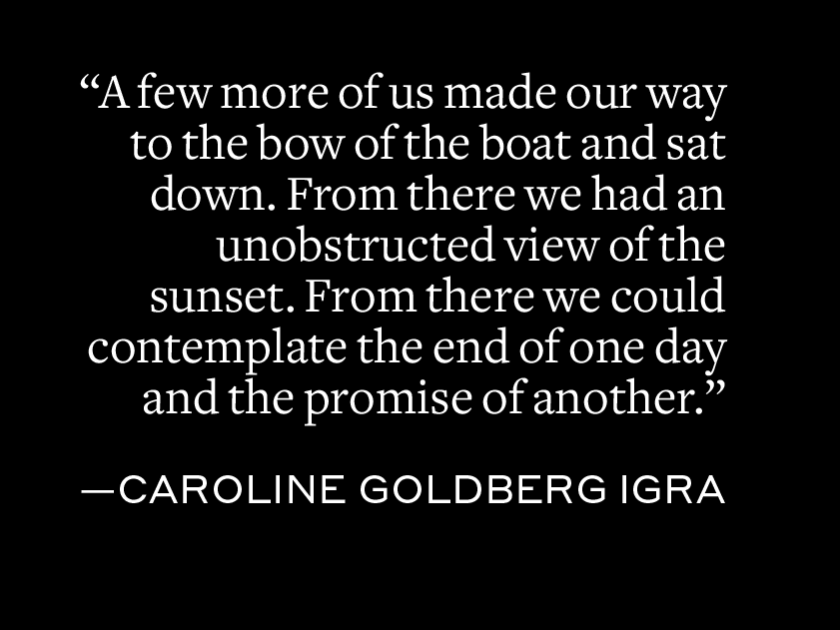
This piece is part of our Witnessing series, which shares pieces from Israeli authors and authors in Israel, as well as the experiences of Jewish writers around the globe in the aftermath of October 7th.
It is critical to understand history not just through the books that will be written later, but also through the first-hand testimonies and real-time accounting of events as they occur. At Jewish Book Council, we understand the value of these written testimonials and of sharing these individual experiences. It’s more important now than ever to give space to these voices and narratives.
The temperature was high, the skin on my arms sticky. I was on a boat, sailing out in the open, but it felt like there was no air. One month has passed since that evening, but it feels like yesterday. Time has slowed to a crawl this last year in Israel.
Embarking on a three-hour cruise off the coast of Israel had seemed safer before the killing of Hamas chief Ismail Haniyeh in Tehran and the threat of an Iranian counterattack. Now, the whole country was bracing itself, holding its breath. The ten women in my Tel Aviv-based book group had jointly decided to screw it all and go through with the excursion planned months earlier. But that didn’t mean we weren’t afraid.
Were we always going to be afraid?Were we ever not?
I had landed back in Israel just the day before after a long summer in the US and was exhausted. Suffering from jetlag, I felt disoriented and more than a little nauseated.
But there was the coastline of Israel, the view I so welcomed at every homecoming from 8,000 feet up as I entered Israeli airspace. We’d sailed out of the Herzliya Marina, a jumble of masts, sails, and cafés. To the south, Tel Aviv stretched long and proud, silvery lights from the buildings hugging the beach shimmered in the sunset before ending at the minarets of Yafo. Straight behind us, was the setting sun, that gorgeous ball of orange I’d watched emerge from the ocean early in the morning from a house on the New Jersey shore just the day before. The wonder of the globe, where I could watch the sun rise on one side, then set on the other within twenty-four hours, was tarnished today by an enormous sense of sadness mixed with fear.
What lay ahead?
“What about these?” My friend J. pointed to a plastic box of what looked like pastries. Another friend reached out to open it.
“They’re savory. They have spinach inside.”
J. popped one in her mouth. “Yes. Not sweet. Good. They go perfectly with the arak.”
Everyone laughed. Upon stepping onto the boat, we’d been greeted with a homemade cocktail made from the licorice-flavored liquor and lemonade. Served straight up from a squeegee bottle like those usually lodged on the stem of a road bike, each sip was accompanied by the unmistakable taste of plastic. No one cared. There wasn’t one person there who didn’t want to get slightly inebriated.
Was there a better way to endure this period?
“Those missiles fell into the sea.” All eyes turned to M. and the comforting cacophony of conversation evaporated. Just days earlier two missiles had been shot toward Tel Aviv from Gaza. The red alert had sounded, and half a million citizens had scuttled into the nearest shelter. It was a relief to hear that, falling into the water, they hadn’t done any damage. The silence between us stretched on until someone laughed, somewhat forcibly. “Well, that was then. Best insurance it won’t happen tonight.”
Another round of laughter, this time even more nervous in tone. M. got up from the table and headed around the cabin at the bow of the boat where there was a better view of the setting sun.
The repartee around the table continued. J. pointed at the crackers. “I’ll take one of those. They’re so thin.”
“They’re supposedly healthy.”
“Healthy?”
“Well, low calorie.”
J. smiled and reached back down to take a whole handful. “That’s good enough for me.”
Talking about food, suggesting something as mundane as dieting, was like taking shelter. This was territory most of us recognized and could retreat to in times of need. It was a relief from mentions of the war. No one wanted to talk about that. We didn’t need to. It was there — every moment of this past year.
And instead of undermining the pleasure of the evening, the underlying tension of the potential dangers and the mounting losses made that time spent watching the sunset together on a boat out in the Mediterranean that much sweeter. I pushed aside my fatigue as I watched the choppy waves break along the side of the boat. I’d rest when I was dead.
And that wasn’t going to be today.
All that counted now was being part of a unified effort to find moments of happiness. I took another sip of my plasticky drink. A few more of us made our way to the bow of the boat and sat down. From there we had an unobstructed view of the sunset. From there we could contemplate the end of one day and the promise of another.
We dangled our legs and let ourselves drift.
The views and opinions expressed above are those of the author, based on their observations and experiences.
Support the work of Jewish Book Council and become a member today.
Caroline Goldberg Igra is an author, an art historian, a triathlete, and a mother. A native Philadelphian, she lives in Tel Aviv. She has published nonfiction, art historical articles, and exhibition catalogs. Her monograph on J.D. Kirszenbaum was chosen as one of Slate Magazine’s Best Books. Her first novel, Count to a Thousand, was published in 2018, From Where I Stand, in January 2022. Her forthcoming novel, Pictures of My Desire, will be published in October 2025.



